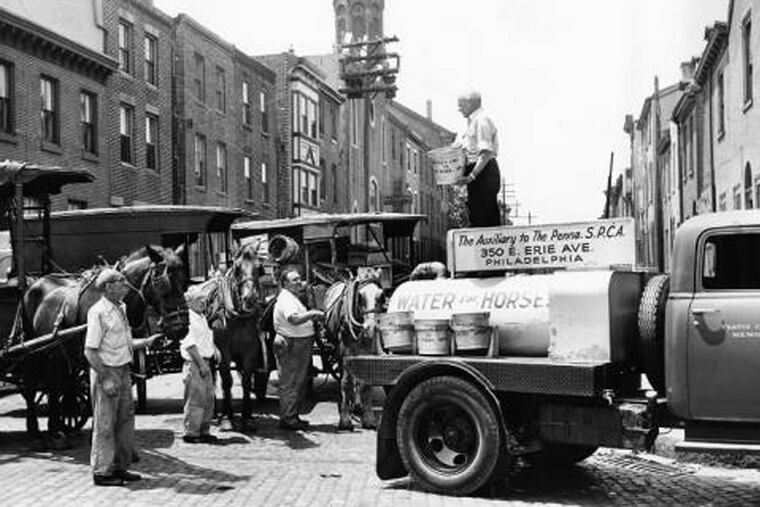For PSPCA, 150 years of crazy stories and animal rescues
Agency workers have dealt with dog-fighting rings, snakes and even a tiger. But it all started in 1867 with Philadelphia's urban horses.

When Pennsylvania SPCA officers entered the makeshift stable in West Philadelphia in May, they found horses with their ribs showing and obvious medical problems, and no food in sight. A newborn foal lay in a manure-covered stall, its mother too malnourished to nurse.
"The complaints we received were that they were without care for over a week," said Nicole Wilson, the agency's director of humane law enforcement.
The PSPCA persuaded the owner to sign over four horses with the most immediate needs, including the foal and its mother. One horse with a broken leg was eventually euthanized. The case is part of an ongoing investigation, Wilson said.
These days, dealing with horses in an urban setting is only a small part of what the PSPCA does. But that is how the agency got its start, 150 years ago Tuesday.
The nation's second-oldest animal welfare organization, the Pennsylvania Society for the Prevention of Cruelty to Animals was founded by Col. M. Richards Mucklé in 1867 to end the mistreatment of horses that he had observed in the city.
To mark the 150th anniversary, the shelter will hold a party at its headquarters at 350 E. Erie Ave. at 1 p.m. Wednesday.
Over the years, the shelter has changed its strategy but not its mission. About 5,000 animals a year pass through the shelter's doors.
"Our mission has always been the largest in the state," said Julie Klim, chief executive officer. The shelter's scope and reach — it serves 23 counties — set it apart from all others in the state, she said.
PSPCA staff have advocated for animals on a state level. In 1964, they pushed for legislation to protect animals, including those that have been abandoned. In 1974, they backed an animal cruelty bill. In 2015, they implemented a "barn cat" program to place feral cats and those not suited to living in a home. Last year, they advocated to ban the sale of dogs sourced from puppy mills in Philadelphia.
In addition to investigating cruelty cases, the shelter takes in animals surrendered by owners or transferred from other shelters, and strays picked up on the streets. About 97 percent of them end up getting placed.
The shelter was first at 1627 Chestnut St. It wasn't until 1948 that it moved to Erie Avenue. It now also has a satellite location in Fishtown.
There are also an in-house hospital, a forensics program, outpatient veterinary services, and training classes.
Leonard Knox has worked at the PSPCA for more than 37 years — and collected quite a few stories. He joined as an ambulance driver and is now one of the humane law enforcement officers.
Once, Knox spotted a tiger in the back of a pickup truck. He followed the driver, who stopped, grabbed the animal, and ran. Knox gave chase but was held off when the man's friends circled him.
Six months later, the agency received a call about the tiger — now the size of a large German shepherd, he said. When he approached, the animal was sound asleep on the man's bed and purring like a kitten.
"The zoo took it," he said, adding that the shelter is not set up for big cats.
The Philadelphia Zoo also helped out when two men were bitten by snakes they kept as pets – one a Gaboon viper and the other an Indian cobra.
"It is always something," said Knox, who learned to "expect the unexpected" when answering calls.
While the approach to animal care and control has changed over the years, Knox said, some problems have persisted for decades.
There are still dogfights, hoarders, bad habits passed down from one generation to the next, and owners who do not provide proper shelter or nutrition to their animals.
"It doesn't stop," Knox said.